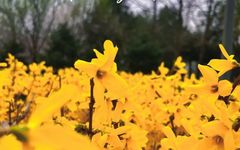
Lianqiao
One Forsythia suspensa One
千步连翘不染尘,
降香懒画蛾眉春。
虔心只把灵仙祝,
医回游荡远志人。
——《诗经》
✦
Introduction

Lianqiao (Forsythia suspensa) belongs to the Oleaceae family, Forsythia genus
Distribution in China: Widely distributed, Lianqiao is native to the central and northern regions of China, primarily found in the central and eastern Qinling Mountains and the western foothills of the Taihang Mountains, exhibiting a T-shaped distribution.
Growth Habits: Prefers a warm, humid climate with plenty of sunlight, is cold-resistant, drought-tolerant, and not demanding on soil quality, often found growing wild in sunny slopes, forest edges, or valleys.
Morphological Structure
LIANQIAO



LIANQIAO
Branches · Flowers · Leaves · Fruits
Lianqiao is a deciduous shrub that blooms in early spring, with flowers appearing before leaves.
——Branches are spreading or drooping, brown or light yellow-brown.
——Leaves are usually simple, oval or elliptical, with a sharp tip, dark green on the upper side and light yellow-green on the underside.
——Lianqiao flowers bloom from March to April, either solitary or in clusters, with green sepals, a faint fragrance, and bright yellow flowers, accompanied by green leaves that enhance the beauty of the golden blossoms.
As described in poetry, “千步连翘” (thousands of Lianqiao blooming together) creates a bright scene, reminiscent of the beauty of “油菜花开香满谷” (rapeseed flowers filling the valley with fragrance).
Identification of Similar Species — Lianqiao vs. Yingspring
Yingspring — Oleaceae genus Jasminum, has a bushy appearance, is shorter, with arching branches that easily droop.
Lianqiao — Oleaceae genus Forsythia, appears as a shrub or small tree, is taller, with branches that do not easily droop.
Yingspring has six petals; Lianqiao has only four petals.
Yingspring’s young branches are green; Lianqiao’s young branches are darker, generally light brown.
Yingspring has trifoliate leaves; Lianqiao has simple or opposite trifoliate leaves.
Medicinal Value
LIANQIAO

LIANQIAO
Do you remember the popular “Lianhua Qingwen Capsules”? One of its main ingredients is the beloved “Lianqiao”. The golden Lianqiao is not only widely used in urban greening as an ornamental tree due to its beautiful appearance but also ranks among the 40 commonly used medicinal materials in China due to its unique medicinal value. Traditional Chinese medicines that primarily use Lianqiao include Shuanghuanglian Oral Liquid, Lianhua Qingwen Capsules, Shuanghuanglian Powder Injection, Yinqiao Jiedu Pills, and VC Yinqiao Jiedu Tablets.
Lianqiao is first recorded in the Shennong Bencao Jing, with a bitter taste and slightly cold nature, possessing the effects of clearing heat and detoxifying, reducing swelling and dispersing nodules, and dispersing wind-heat. It is mainly used for wind-heat colds, initial stages of warm diseases, high fever with thirst, delirium with rashes, and painful heat dysuria. Modern pharmacological studies have shown that Lianqiao has various pharmacological effects, including antipyretic, anti-inflammatory, antibacterial, antiviral, antitumor, immune regulation, and antioxidant properties.
Lianqiao is known as the “sacred medicine for sores”. China produces a large quantity of Lianqiao, with abundant resources, complex components, and diverse biological activities. Market statistics indicate that the annual usage of Lianqiao is increasing at a rate of about 20%. Currently, most Lianqiao medicinal materials come from wild resources, and improving the management system for wild medicinal materials is key to the sustainable use of these resources.
Cultural Significance
LIANQIAO

LIANQIAO
Origin of the Name
One explanation: Lianqiao is named for its resemblance to ancient vehicles called “Lianche” and “Qiaoche”.
Another explanation: In Xinyi City, Henan Province, there is a place called Dachen Gou, located east of Qibo Mountain, where Lianqiao grows abundantly. Lianqiao is not only a precious medicinal material but also a suitable ornamental tree. Its leaves are renowned as tea ingredients, and its fruits are excellent for clearing heat and detoxifying. A lesser-known story about Lianqiao tells of Qibo, who, 5000 years ago, gathered and cultivated herbs here. Qibo had a granddaughter named Lianqiao. One day, while they were foraging, Qibo accidentally poisoned himself. Lianqiao, seeing her grandfather in distress, quickly crushed some green leaves and fed them to him. After a while, Qibo recovered, and he began to study this green leaf, discovering its excellent heat-clearing and detoxifying properties. He recorded it in his herbal compendium, naming it Lianqiao after his granddaughter, and planted many Lianqiao in Dachen Gou, a story that has been passed down through generations.
Flower Language
The flower language of Lianqiao symbolizes guidance, prophecy, magic, and eternity.
· Guidance — Lianqiao flowers are known as “St. John’s Grass”, believed to guide those blessed by its flowers to greatness.
· Magic — It is said that placing Lianqiao flowers under one’s pillow allows one to dream of their future partner’s appearance, a beautiful magic that brings happiness.
· Prophecy — It possesses a keen insight, able to perceive hidden aspects of food and future events.
· Eternity — The long-lasting bloom and pleasant fragrance of Lianqiao symbolize a longing for eternal beauty, making it a perfect gift to express unchanging feelings.
(Source: Sogou WeChat)

Today isMarch 18, 2024 Monday

Free Mountain Water, Clear Lu’s
Heroic Land, Red Xinchuan
Welcome!


Submission Email:[email protected]


Long press the QR code to follow me


